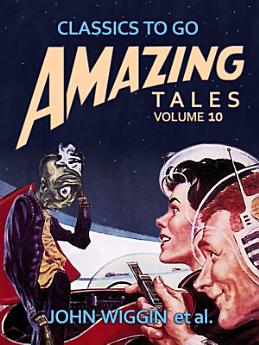Amazing Tales Volume 10
About this ebook
About the author
John Wiggin, an enigmatic figure in the realm of speculative fiction, emerged as a literary force in the early 20th century. Born in 1892 in a small town in New England, Wiggin's early life was steeped in the mystique of local folklore and the burgeoning industrial age. His fascination with the intersection of technology and human experience became a hallmark of his writing. Wiggin's literary contributions are notable for their visionary exploration of future societies and the ethical implications of scientific advancements. His works often grappled with themes of human identity, artificial intelligence, and the moral quandaries posed by technological progress. This foresight earned him a reputation as a pioneer in the genre, influencing contemporaries and future generations of writers, including Isaac Asimov and Philip K. Dick. Despite his acclaim, Wiggin was no stranger to controversy. His outspoken views on the potential dangers of unchecked technological growth and his critiques of governmental overreach in scientific endeavors sparked heated debates. Wiggin's advocacy for responsible innovation and his warnings about the dehumanizing aspects of technology were revolutionary for his time, resonating with modern readers who grapple with similar issues today. Wiggin's legacy extends beyond his written works; he was a mentor to many young writers and a vocal proponent of creative freedom. His influence is evident in the enduring popularity of speculative fiction and its capacity to challenge and inspire. John Wiggin remains a compelling figure whose ideas continue to provoke thought and discussion in an ever-evolving technological landscape.








